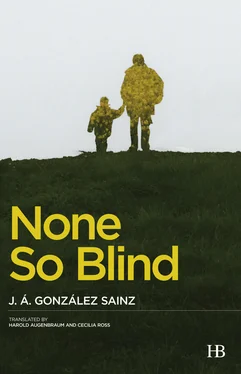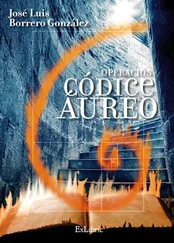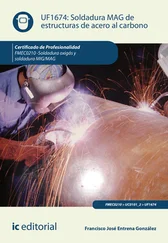In total it might only have been a few minutes, perhaps just a few seconds, nothing in comparison to how long it took him to get up afterward — a neighbor came in with his wife, turned on the light, and, seeing him laid out and bloodied on the floor, they both averted their eyes and went past him as if he didn’t exist — and move little by little, bleeding, his body completely shattered, as if life itself might slip away each time he made a movement, back to the elevator door, more dragging himself than walking.
The following week, with unflappable gravity, with something also unmistakably sunny in his demeanor, something akin to happiness, a serene, stubborn happiness radiating from his eyes, he stood as a photojournalist snapped another shot of his sullen profile and thick mustache, and the wrinkles that furrowed his brow from one side to the other of his forehead, on which you could now see the remnants of some sort of laceration of major proportions, behind the banner on which, with large, simple letters on a white background, they continued to demand freedom, and surely not for that one man alone.
9
Almost a year after the industrialist’s kidnapping, in a carefully designed operation into which there went several long, patient months of meticulousness and perseverance, the police found the hole in which he had been held captive for just under a year, like one of the living dead. Not the filthiest of dungeons of times past or even the soulless, systematic annihilations in the concentration and extermination camps of our most arrogant century — at least there those poor people were able, for whatever it’s worth, to see daylight and a human face, he told himself — were, in the end, what you might call much worse, he thought in stupefaction upon reading the details in that day’s newspaper of the pit where that man — and he always called him that man , and nothing else — had survived, day after day and hour after hour, until he’d tallied up almost a year of complete isolation.
With no other source of light than a single bulb, permanently lit, day and night, and space enough only to barely spread his two arms and take one, two, three, four, and maybe five little steps in any one direction, with no other air than the dank, rancid stench of the stagnancy therein, and no other connection with the world than the sound, a few times a day, of footsteps, and then afterward, not always immediately but always excitedly, from the other side of the hatch in the ceiling through which they supplied his food and retrieved his bucket of feces, isolated phrases like “eat this, you dog” or “have you noticed how much it smells like shit down there?” and never knowing anything, not only about his family or the world but not even when it was day and when night, when it was autumn or winter or spring again, or if they were going to kill him the following day, or the next, or if they were perhaps going to exchange him, or maybe just leave him inside, forgotten, until he gradually decomposed there alongside his feces in the airless air of that tomb and that spaceless space, with no other conversation in the end than finally shouting at his jailers, pleading, pleading with them to kill him, to please kill him already, once and for all, and not to keep him there like that any longer, and with God to take him, by all that is holy, for Him, if no one else, to take him away from there for once and for all, with nothing other than that which filled everything around him and which everything had become, the air and the space and likewise his brain, and which sometimes was time and other times was outright anguish, thick, solid, piercing anguish, diffuse, pitiless anguish that with an eye to rounding up and keeping everything for itself, made off even with the secret of whether he was still in his right mind or if they had managed to drive him out of it, with nothing but the whole of all that all the time, that man, that man who was a man before and after he was whatever he was apart from a man, had held on to life in that filthy hole for almost a year in the lives of others, hanging on to who knows what roots on who knows what cliffs or ravines.
Not even an animal, not even the worst of animals is treated like that, he thought; not even the worst vermin is deprived for that much time not only of light and space and air and freedom but even of the company of anything other than their own excrement for such infinite lengths of time, deprived even of all sight of a human face, even that of his own tormentor.
10
It was a month or two ago that Asunción, his wife, had left home; she’d gotten a job in some organization he didn’t know or even care to know the nature of but that paid her a salary that was not only good, it was higher than his own, and when she came back to the apartment in one of the six identical buildings alongside the highway leading to the factory, under the pretext of stopping by to pick up something or other — take whatever you want, I’ve already told you, or you know what, take everything, that way I’ll have more room — it seemed like her only objective was to offend him with the insinuations and reproaches she would continuously fling at him from the very moment she crossed the threshold and set foot in the house. As if there were something lacking for her if she didn’t come and insult and ridicule him, he thought, as if she couldn’t feel comfortable with herself or really be someone, deep down, if she didn’t fight with him about something, anything, even though in fact she was the only one shouting and fighting.
“I never would’ve imagined that you could end up being so reactionary and fascist,” she spat at him the moment she came in the last time. “So recalcitrantly reactionary and so inveterately fascist.”
“I’d sure like to know what you think those words mean and what you’d know in general about any of that.”
She’d had her hair cut in an odd way; it wasn’t a style that gave the impression of being old-fashioned so much as what one might call primeval or primitive, sticking up in tufts, as they would have said back in the village, with very short bangs and an absurd mane that fell over the back of her neck but not down the sides, which made her face look very fat and her eyes bug out with a now strangely severe glow.
But most of the time, rather than taking the bait and answering back, he would stare at her without saying a word and remember the first years they knew one another, their dreams together, the happiness and the hardship they had shared, the good times and the not-so-good times, and how pretty and affectionate she was with him back then and had been for so long, the splendid body she had, even though she preferred to dress modestly, and how much he loved seeing her naked, because in addition to her curves, which were so impressive, it seemed he could see her entire soul. You couldn’t have found a more docile, affectionate person in the whole village, he remembered her father saying to him when he went to ask for her hand, and when he saw that he had given a sort of small shudder when he heard the word docile , her father told him that he knew the term no longer had the same meaning among the young folk as it had before, but that it didn’t mean subjugated, submissive, but rather the opposite of rigid — that she was accepting or amenable or open or something along those lines, he said.
Words lose or acquire meaning, and they may even become different words, he told himself, so why shouldn’t people become different people, too. That’s why he wouldn’t answer her back, wouldn’t enter the ring — because to whom was he going to answer back? And for what? But she, far from growing calmer when she saw he was in no mood to fight, seemed to get even more worked up by his silence, by his attitude of resignation, in which she found the excuse she needed to allow herself to give free rein to her arrogance and continue demeaning him, again and again, even though he would neither take part in the argument nor provide her, either through gesture or word or, least of all, any sort of tone that might be interpreted as rude or disrespectful, with anything she might be able to latch onto and use to keep coming at him.
Читать дальше












